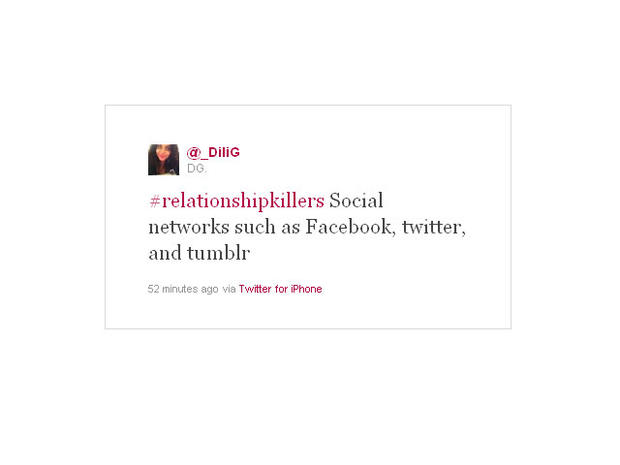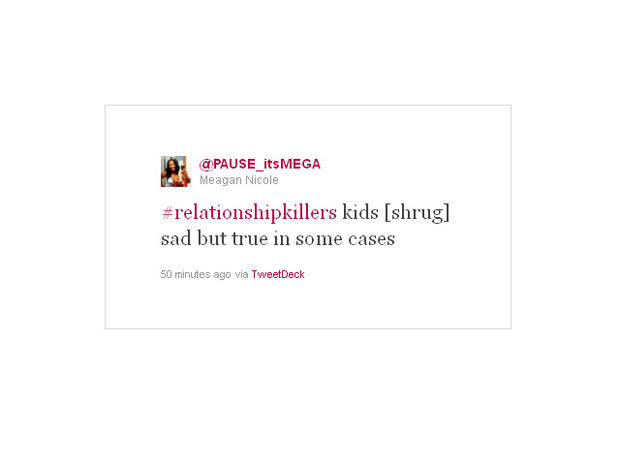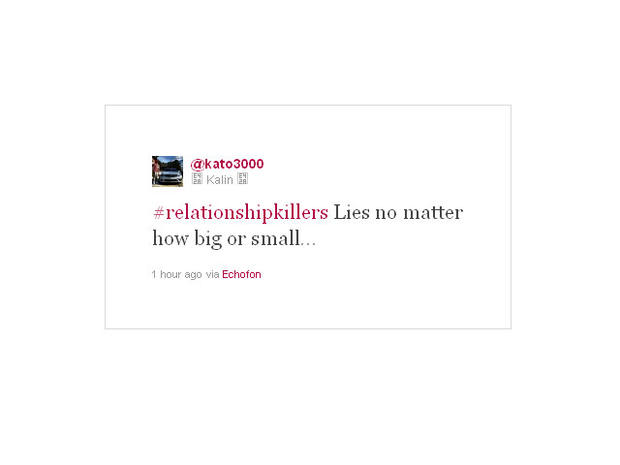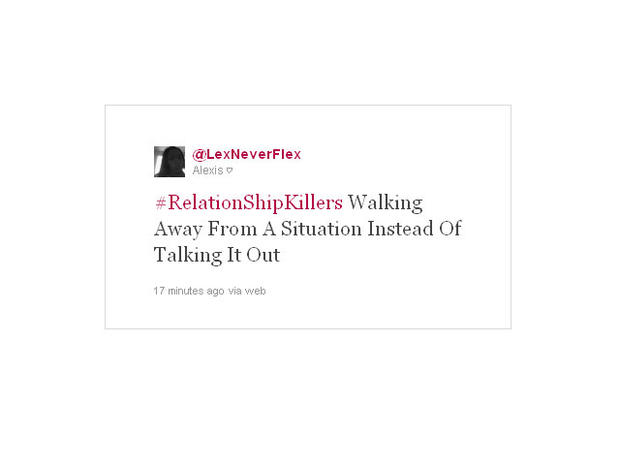Psychologists analyze the most-tweeted-about relationship killers
When the term "relationship killers" is trending, one can't help but click and scroll through the various reasons a lovefest can end. Maybe you are struggling with a relationship of your own or just plain paranoid you might one day end up where some of these disappointed tweeters have landed.
Here, we reveal 10 of the major "relationship killers" according to tweeters. But not to worry, we asked relationship experts to provide helpful advice on how to avoid them.
Social networks
Irene Levine, professor of psychiatry at New York University's School of Medicine and author of "Best Friends Forever: Surviving a Breakup with Your Best Friend," warns not to blame social media for relationship problems.
"It's easy to say that social networking damages relationships but that's an over-generalization," she says. "Infidelity, acting-out behavior, hyper-sexuality and mistrust are the villains, not social networks."
To avoid social-network-related fights, Levine advises, "Don't ignore your partner when you're celebrating your anniversary by tweeting during dinner. Don't say anything about your spouse on Facebook or Twitter that you wouldn't want his or her boss, mother, best friend, or him or her to see."
Last, unless you have concrete reasons to believe your partner is lying to you, you should trust him or her.
Comparing past to present
Don't compare, advises Dr. Carole Lieberman, psychiatrist and author of "Bad Girls: Why Men Love Them & How Good Girls Can Learn Their Secrets." "Whenever you compare the past to the present, it makes your present partner feel diminished and inadequate," she says. "Even if you say that your present partner is better in some way than a past partner, your present partner is left to wonder if he or she falls short in other ways."
"Everyone wants to feel special and unique - not as though they are always being compared to a past experience," Lieberman adds.
Kids
Is this true? Natalie Robinson-Garfield, psychotherapist and author of "The Sense Connection, Discovering How Your Five Senses Determine Your Effectiveness as a Person, Partner, and Parent," says yes, children can ruin a relationship. But, they can also enhance it. "They take attention, expenditures, money, and time away from the parents," she points out. "They also introduce love, humor, affection, curiosity, and novelty."
To keep your love strong with the responsibility of being parents, Robinson-Garfield suggests that couples have private time - either at home or out to ensure that their relationship stays alive. "I advise my patients to have an evening in bed, naked with no TV or electronics," she adds.
Insecurity
"Certain personality traits are often associated with people who are insecure and lacking self-confidence," Levine points out. From bragging to constantly requiring reassurance, not loving yourself or knowing your self-worth can certainly lead to relationship problems.
Since problems like these are deep-rooted, Levine suggests that individuals who suffer from this should speak to a mental health professional to find out the reasons for this behavior and ways to change it.
Lies - even small ones
While an occasional white lie shouldn't ruin a relationship, if it becomes a habit, the dishonesty can eventually destroy trust between a couple. "The same way droplets of water can make a whole through a rock over time, lying to your spouse that you were tied up at work when you actually had a beer with a buddy will make one mistrust their partner," says Dr. Victoria Zdrok Wilson, clinical psychologist and author of "The 30-Day Sex Solution."
If you and your loved one find yourselves in the little-white-lie predicament, Wilson recommends you forgive, not hold onto grudges and reward honesty.
Taking your significant other for granted
Although this can be a frustrating thing to deal with, if you're feeling like you're taken for granted, Lieberman suggests you not complain or nag. "This will turn off your partner," she points out. "Instead, start being more mysterious and unavailable. Make plans that don't include your partner - in other words, get a life [that's] more exciting and interesting than you have had."
If you realize you're taking your partner for granted, you should talk to him or her. "Acknowledge to your partner that you realized that you've been taking him or her for granted and you want to make changes," she suggests. "Ask him or her for input, such as how he or she has been feeling about being taken for granted and what changes he or she would like to see in the relationship."
Then, have some fun! "Taking a trip or taking up a new hobby together (especially if it's adventuresome) is a great way to shake things up and see each other in a new light," Lieberman adds.
Being clingy
Levine says being clingy can lead to relationship issues. "A clingy person has no boundaries... and may need to stay in contact constantly, demand exclusivity in terms of time and other people in one's life, and be extremely possessive," she explains.
If you are a clingy person, it's a good idea to find other interests besides your relationship, like hobbies or activities, Levine points out. "Find ways to balance your time and interests."
If you are dating a clingy person, Levine recommends, "You need to [tell] your significant other that you need some space of your own but that it doesn't diminish how much you like to be around him or her." Set clear boundaries on how much or how often you'd like to see the person you're dating - and negotiate around them.
Not talking
When it comes to talking through a fight or argument, Robinson-Garfield says it's okay for your partner to walk away for a bit and not talk. "[It] is a good immediate solution... Then, talk it out when tempers have cooled," she advises.
Once you both have cooled off, it's important to communicate properly. "The most effective way is to try to understand your partner's viewpoint and have compassion," Robinson-Garfield explains. "The other important aspect is to search yourself and see what you might have contributed to the disagreement."
Don't forget to negotiate and barter, she adds. They are resolution tools.
Lack of sex
"Sex is not only incredibly beneficial to our physical health, it's crucial to the health of our relationships," says Wilson. "Sex allows a couple to reconnect, [plus] the hormone oxytocin released after orgasms helps us forgive and let go of resentment and grudges."
To improve your sex life, a couple must remove all of the negative emotional barriers that are preventing them from connecting, Wilson explains. She tells couples to practice the five A's: attention, affection, appreciation, affirmation and adoration.
You can also see a couple's therapist or try reading Wilson's book, "The 30-Day Sex Solution," for some helpful exercises.
Having nothing in common but sex
Although sex is a binding force in a relationship, it's not enough to stay together. "Sex is only magnetic during the lusty infatuation stage that lasts on average from 18 to 36 months," Wilson points out. "After that, passion is no longer effortless and a couple has to actually like each other in order for sex to feel truly satisfying."
There's nothing wrong with a relationship based purely on sex as long as both partners are honest with themselves and each other about it, and there are no unrealistic expectations, Wilson says. "Sometimes sex buddies change and grow together and the relationship metamorphoses into something greater." But Wilson warns, most sex buddies break up when the lust wears off.
Her advice to couples in this situation: "Enjoy the sex, don't have great expectations and let nature take its course. Remember that if all you have is sexual compatibility, it will require a lot of compromise and cooperation to make the relationship work."










